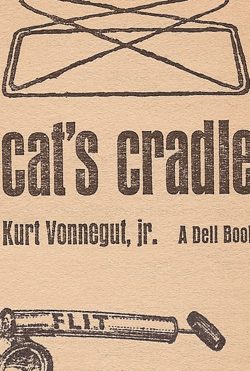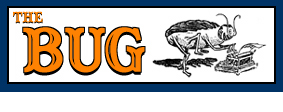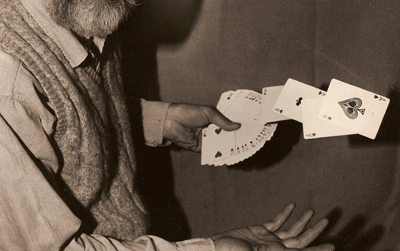 I want to write about Kurt Vonnegut and what his work means to me and my father, a man I call Dad, Pop, or Duff (but only on the phone). Except that I barely know what to say. Except that I read Vonnegut because my Dad reads him. And because he’s wonderful.
I want to write about Kurt Vonnegut and what his work means to me and my father, a man I call Dad, Pop, or Duff (but only on the phone). Except that I barely know what to say. Except that I read Vonnegut because my Dad reads him. And because he’s wonderful.
Kurt, that is, though my Dad, too. For his 61st birthday, I bought Dad a copy of Vonnegut’s newest book, A Man Without A Country. Dad was thrilled: he repeated Kurt’s quip that he was going to sue the Brown & Williamson tobacco company, maker of his unfiltered Pall Mall’s, because right there on the package they promised to kill him.
Of course, Vonnegut’s not dead. “The last thing I ever wanted was to be alive when the three most powerful people on the whole planet would be named Bush, Dick, and Colon,” Kurt wrote. Dad laughed and laughed. “I love him,” he said. “Me, too,” I said.
That is more than we’ve said about each other in a very long time.
No matter. I think of Slapstick, perhaps Vonnegut’s most touching novel. Actually, that little exchange makes me think of the book and the dance, sport, or way of living by the same name. Slapstick. It used to be, when I was younger and thought I had the answers in my grip, or just beyond my grip, that I could bully some Truth about Love out of my folks, and maybe anyone who’d listen. There were some roaring arguments, let me tell you.
Now, there’s Slapstick, and it’s more genuine. “A little less love,” Kurt asks, in that novel, “a little more common decency.” So it goes.
My Dad has read everything that he is aware of of Kurt Vonnegut’s. I like that: “everything I’m aware of.” He’s aware, has recognized, that Kurt Vonnegut writes letters, grocery lists, notes to his wife on junk mail, notes in the margins of books, doodles on stationary from Kurt’s old Saab dealership, memos in checks, and so on. Like all of us.
Dad’s no obsessive: he has no interest in these things. If he had the opportunity to sit down and listen to Mr. Vonnegut talk over coffee or beer, my Pop would be the happiest man on earth. He knows that Kurt isn’t his secret friend, that calling him ‘Kurt’ doesn’t make the two of them any closer than calling the President an asshole makes him a sworn enemy (though my Dad would relish that). But Dad believes, as I do, that the men and women who write the books we love are trying to tell us the hidden truths that they’ve discovered and have struggled to write about. They’re trying to tell us what they’ve learned.
I’m glad, in his later years, that my Pop has someone like Kurt Vonnegut, a curmudgeon, a jokester, and a guy in his later years, to show people his own stumbling path so my Dad might have a few easy steps himself. As a man much younger, I’m glad I’ve also got Kurt Vonnegut. I will always be grateful for a man who admits, in Slapstick again, that “this is what life feels like to me” and then proceeds to write of his sister’s early death, her husband’s accidental death just two days before her own, his awkwardness in the world, and then a heartbreaking story of the apocalypse. By the way, the italics in that last quote are his.
Like most young people, my first Vonnegut book was Slaughterhouse-Five, but I’m pleased to say it wasn’t assigned to me by anyone, unless you count my Dad’s strong recommendation as an assignment. As is easily imaginable, it blew my mind. I was thirteen.
Slaughterhouse tends to screw with the brains of whoever reads it (except George Will); it still stands as a breathtaking book all these years later. And I mean that literally. I read it again for the first time in ten years and my breath caught in my lungs at one word, repeated at the very end: “Poo-tee-weet?” A bird in Dresden said that, after the city was firebombed, and the survivors emerged into spring.
Read the book and you’ll see what I mean about the breathlessness.
Vonnegut, though, can also be a bitter pill, and the wrong medicine if you’re not careful. I next read, again at age thirteen, Deadeye Dick, which I’ve avoided rereading it as it depressed me so terribly back then. Deadeye is ostensibly about a kid whose father saved Hitler’s life, and on a bored day the kid shoots a gun through his back window and kills a mother when that shot smacks her right in the forehead.
Furthermore, his city–Midland, Ohio–is hit with a Neutron bomb. For those of you who don’t recall, the Neutron bomb is the one that kills everyone but leaves the buildings behind, probably to be plundered and repopulated by the conquering army. The thing scared me.
But I also felt that it would be no surprise if someone in my family, maybe even me, had done something as foolish and horribly coincidental as saving a shit like Hitler. And I also thought that bombing my hometown of Mt. Pleasant, Michigan with a Neutron bomb would be an improvement to humanity. Especially if I was in it at the time.
So I stopped reading Vonnegut for almost ten years. Thankfully, my Dad, who was in his own turmoil at the time, didn’t stop. Kurt Vonnegut helped get him through some of the madness he saw each and every day, which isn’t to say that either one of us really suffered. I lived in a lovely little Republican small town with a University and a public television station and Monty Python records. My Dad lived in his mother’s decrepit old house with its sagging roof, filled with squirrels and cat shit, while he worked at a lumber yard and wondered what he was doing with his life at 40.
Reagan had just been elected a second time. No wonder Vonnegut was such a pal. Neutron bombs, indeed.
These were years when Dad and I drifted apart, ignored one another for the most part, him trying to square off against middle age, and me trying to square off against becoming an adult in high school and college, neither of us doing a great job of it. My Dad moved to North Carolina to teach, which is where he lives and what he does today.
He’s also a magician. I’ve always admired his magic, close-up magic, slight-of-hand, and I admired how, even when he was hired to perform at a stuffy country club in the mid-80s, he would show up in his long beard and make his magic show mystical, bizarre, and funny. Last year, for Father’s Day, I bought him a card that showed a hippie on the front, and inside it read something like “Thanks for not being a greasy, pot-smoking hippy”, or words to that effect–I added ‘greasy’, but they misspelled ‘hippie’. I wrote, “Thanks for not being like every other golf-loving idiot”, or something like that.
I may or may not have closed with ‘love’. It’s not important, really. “A little less love, a little more common decency.”
Dad and I have hugged one another, of course, and it’s fun. Like Kurt wrote in Slapstick, hugging someone you haven’t in a long time, or not at all, is a little like rolling on the floor with a Great Dane.
Only for me, I’d say it’s like torturing our cats. In a loving way, not an Abu Girhab way.
It was Dad who told me, when I was struggling at Michigan State, to read Cat’s Cradle. “It’ll help you,” he said. By then I’d only read Slaughterhouse-Five and Deadeye Dick, the former a second time for a class on “Literature to Film” that I aced. I didn’t ace many college classes, so it’s important I mention that when I can.
My version of Cat’s Cradle still called its author ‘Kurt Vonnegut Jr.’, as opposed to just ‘Kurt Vonnegut’, as in later years. A quick and useless fact: I became Peter Schilling Jr. when I was 28, after visiting my Dad of the same name and I realized how much I loved him.
Again, I don’t think I told him that, but I think he got the point. What matters is that he got the point.
Cat’s Cradle was as good as Slaughterhouse-Five, which floored me, because I really thought Vonnegut was another Joseph Heller. That is, the author of one great book (in Joe’s case, Catch-22), the rest shadows of the first (I incorrectly thought Slaughterhouse-Five was Kurt’s first book).
Two things: I admire greatly the Hoenikker family in Cat’s Cradle. Or, rather, I admire Vonnegut’s portrait of them. They are a functional, yet broken, family that Kurt writes honestly about, and one that made me realize we’re all a bit screwy and that’s a good thing. I like that one of the members is a midget, and that this is just a thing, and is not played for laughs. Kurt Vonnegut doesn’t hate anyone in his books. They’re just people, beautiful people.
And this: Cat’s Cradle identifies and defines a duprass. Two supporting characters, Horlick & Claire Minton, are in a duprass. “They were lovebirds,” Kurt writes. “They entertained each other endlessly with little gifts: sights worth seeing out the plane window, amusing or instructive bits from the things they read, random recollections of time gone by. They were, I think, a flawless example of what Bokonon calls a duprass, which is a karass composed of only two persons.”
Bokonon is a spiritual leader in Cat’s Cradle, who writes little aphorisms that help explain the world to his confused followers. A karass, Bokonon explains, is the belief that “humanity is organized into teams, teams that do God’s Will without discovering what they are doing.” As I said, a duprass is one that’s made up only of two. And “‘a true duprass can’t be invaded not even by children born of such a union.”
Back then, I wanted to be in a duprass more than anything.
Even better: today I think I am.
Vonnegut writes: “members of a duprass always die within a week of each other.” I’d be happy to die within a week of my lovely wife. However, I don’t really believe in that part of the equation. Probably I’ll linger on for many bitter years afterwards, or vise-versa. True, ’tis a morbid thought, but you think of these things when you read Vonnegut.
As the years have passed, my Dad’s been through his share of miseries and pleasures, and has been aghast at where the world has gone over the last few years. We’re not Christians, nor Jews or Muslims or Buddhists, or even Bokononians, if that’s what they’re called. So neither of us has a church to lean on or a thick-as-cake bible to turn to when the going gets rough.
Vonnegut helps. However, neither of us read Kurt for spiritual guidance–he’s a peaceful man, but he would probably beat us with copies of his book if we did look upon him as a guru of sorts. No, Kurt’s a fellow traveler, and he makes us laugh, and doesn’t expect it in return. We laugh at the good things and the awful disasters. Vonnegut helps those of us who sometimes to have no clue as to what’s going on–and he has the courage to tell us that he doesn’t either, and the wisdom to point out that no one does, not the priests or the President. Least of all the President.
Personally, what I’ve enjoyed learning most from him is that stuff on love: that you don’t need to beat the love out of the people who surround you. “A little less love…” becomes very reassuring, very comforting. Very real.
Kurt’s getting older, obviously, and I know he’s breaking my Dad’s heart by writing less and one day passing on. Frankly, it’s rather selfish of him to die first, when my Dad has so little to laugh about.
In fact, my Dad once saw Kurt speak in Chapel Hill, North Carolina, and he thanked Kurt for the gift of all these gales of laughter. Kurt grumbled. “These kids… they don’t laugh anymore.” Dad said he was right: those students were all reverential, not hooting like my Pop, who could barely sit in his seat, and probably made the youngsters wonder if the old boy was tipsy. They should have laughed more, Dad said, and worshipped not so much. “A little less love…”
There’s a touching piece in Man Without A Country, toward the end, when Kurt writes that artist Joe Petro III saved his life through their friendship. He didn’t elaborate. Yet another instance of his honesty, his vulnerability, stuff that he shares probably because it’s healthy for him, and it might come in handy for the rest of us when we get older.
Kurt has saved our lives as well: me and my Dad’s. Not saved in the literal sense, but saved in the sense that Kurt’s books kept us from having the radio-controlled boxes in our brainstems, like in The Sirens of Titan. A perfect metaphor for how we feel sometimes: like we’re emotionless, controlled creatures with static buzzing in our heads.
Sometimes he’s scared me with his bleak view of the world, and the afterlife, with the suggestions that we don’t control our destinies, that God doesn’t care, if there is a God, etc. But that’s what Kurt believes: and he also believes in people, and in the Sermon on the Mount, and that’s the toughest part: being fully human right now and truly kind. Trying to be like Jesus and knowing you can’t and forgiving yourself and others for that failure. God damn if that isn’t toughest thing.
For whatever reason, Hocus Pocus is my father’s favorite Kurt Vonnegut book. We both agree that Galapagos is his weakest book (though supposedly Kurt’s favorite); personally, I dig Bluebeard and Slapstick the most, though I also believe we both join that fraternity in believing that Slaughterhouse-Five is so sublime it’s what you give the kid who’s never read any of his stuff.
Someday, perhaps when I’m sixty, I’ll read Hocus Pocus and grasp exactly what it is that so moves my Dad. I look forward to that moment.
I look forward to reading Kurt’s other books I haven’t yet read (there’s still quite a few), in part because it’s a new world from the mind of a man I trust implicitly, and because I can talk about it later with another man I trust implicitly. Even if that’s all we talk about, even if it pushes us into mild debate.
Even if there’s a little less love, and more common decency…

